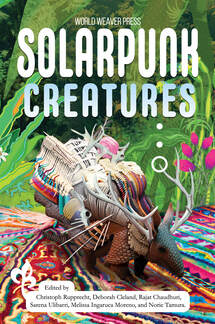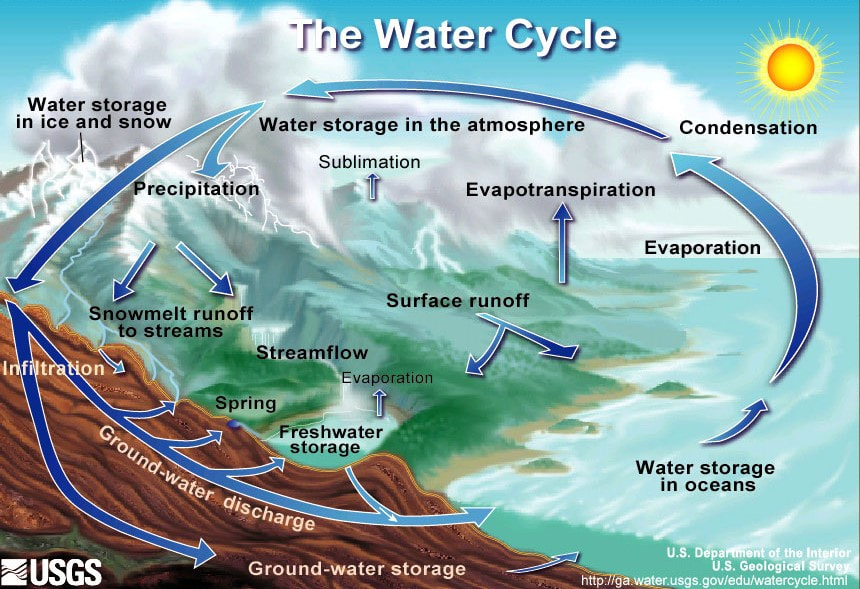 Guest Blog by Lauren C. Teffeau Water is life. But water doesn’t need life, thank you very much. Inorganic water will continue to exist whether humanity does or not, adopting different forms or chemical configurations, and outlast us all. Its indifference to us is matched only by our need of it, which some take as a mandate instead of responsibility. Water is memory. Or that’s at least what the writers of Frozen 2 would have us believe. But that begs the question what if water does remember what we do to it, the substances we commingle with it, how carelessly we run it down our drains? Water is as old as the universe, potentially recording all of humanity’s sins and accomplishments within its reservoirs. Water is cohesive. Cohesion speaks to the attraction water molecules have for bonding with more water molecules. Like seeks out like. But what if that process resulted in not just a bond between hydrogen atoms but also an exchange of information? What if water was some kind of superorganism, parts of it drifting away from the whole, only to return with tales of its experiences to share with the other water molecules? Such were the thoughts I had when writing my short story “Water Cycle” for the Solarpunk Creatures anthology. In it, I wanted to explore what water’s perspective on humanity might look like, separating it into three parts: the past, the present, and the (hopeful) future. I also wanted to ensure I included water in various states of matter and at all the different points of the water cycle. I had a lot of fun writing water as a collective entity, somewhat alien in its inorganic-ness, directly addressing the reader and by extension the whole of humanity. Needless to say it was therapeutic—like a solitary dip in a pool that’s the perfect temperature or an ice cube sliding over skin on a hot day—to imagine water as an unwilling witness to all of our mistakes, gradually growing curious about our actions over millennia, taking measure of our shortcomings but still rooting for us to meet our potential. Not quite ride or die, like a trauma-bonded lover, but there is a fundamental negotiation of obligation throughout the story, exploring the dialectical relationships between mortality and immortality, individualism and collectivism, using and being used, and above all water within and without. Water wants us to know it will be fine without us, but what if we all could be more? Lauren C. Teffeau is the author of Implanted (Angry Robot), a cyberpunk/solarpunk adventure shortlisted for the 2019 Compton Crook award for best first SF/F/H novel. Her climate fantasy novella A Hunger with No Name from University of Tampa Press releases Fall of 2024. Please visit laurencteffeau.com for more information.
0 Comments
Your comment will be posted after it is approved.
Leave a Reply. |
World Weaver PressPublishing fantasy, paranormal, and science fiction. Archives
February 2024
|
- Home
-
Books
-
All Books
>
- Beyond the Glass Slipper
- Bite Somebody
- Bite Somebody Else
- Black Pearl Dreaming
- Cassandra Complex
- Causality Loop
- Clockwork, Curses, and Coal
- Continuum
- Corvidae
- Cursed: Wickedly Fun Stories
- Dream Eater
- Equus
- Fae
- Falling of the Moon
- Far Orbit
- Far Orbit Apogee
- Fractured Days
- Frozen Fairy Tales
- Glass and Gardens: Solarpunk Summers
- Glass and Gardens: Solarpunk Winters
- Grandmother Paradox
- Grimm, Grit, and Gasoline
- Haunted Housewives
- Heir to the Lamp
- He Sees You When He's Creepin': Tales of Krampus
- Into the Moonless Night
- Jack Jetstark's Intergalactic Freakshow
- King of Ash and Bones (ebook)
- Krampusnacht
- Last Dream of Her Mortal Soul
- Meddlers of Moonshine
- Mothers of Enchantment
- Mrs Claus
- Multispecies Cities
- Murder in the Generative Kitchen
- Recognize Fascism
- Scarecrow
- Sirens
- Shards of History
- Shattered Fates
- Skull and Pestle
- Solarpunk (Translation)
- Solarpunk Creatures
- Solomon's Bell
- SonofaWitch!
- Speculative Story Bites
- Trenchcoats, Towers, and Trolls
- Weredog Whisperer
- Wolves and Witches
- Anthologies and Collections
- Novels
- Novellas
- Fairy Tale
- Fantasy
- Romance
- Science Fiction
- Urban/Contemporary Fantasy
- Young Adult SFF
-
All Books
>
- Blog
- About
- Contact
- Press / Publicity
- Newsletter Signup
- Privacy Policy
- Store


 RSS Feed
RSS Feed